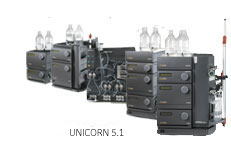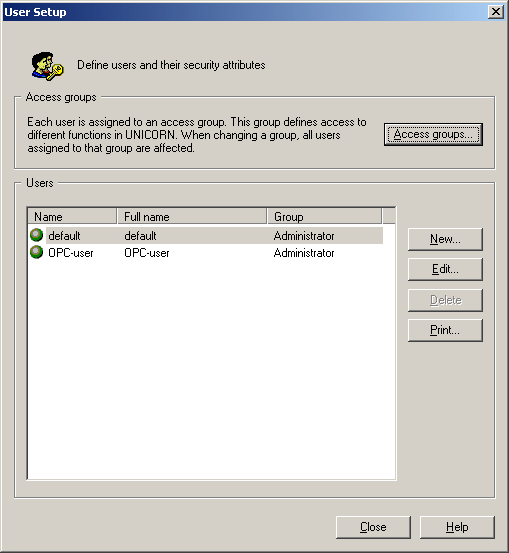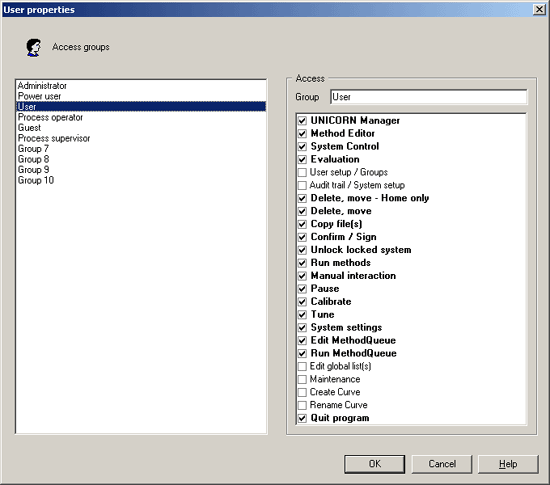

|
|

|
|
User access groups
|

|
|
Introduction

|
This
section describes
-
the purpose of access
groups and access items
-
how to view and edit the access groups
-
suggested responsibilities for some typical access
groups.
|
|
|
|
|
Kinds of access groups

|
A
UNICORN installation has 10 different access groups with different
rights to perform actions in the UNICORN system. Some access groups
are predefined while others are undefined. The table below describes
the different kinds of access groups:
|
Kind of access group
|
Description
|
|
Predefined
|
The following applies to the predefined groups:
-
Each group has a
name that reflects the status of its members, such as Administrator and Process operator.
-
Each group has different rights to perform actions
in the UNICORN system.
-
The names and rights of the groups can be changed
to the requirements of each individual group.
|
|
Undefined
|
If the system administrator wants to create access groups
in addition to the predefined groups, he or she can use the undefined
access groups.
The following applies to the undefined groups:
-
They have generic
numbered names, like "Group 7", "Group 8" and so on.
-
They do not have any rights defined.
-
It is up to the system administrator to define names
and rights to the undefined groups.
|
|
|
|
|
|
The access items

|
The
access items are used to assign rights to the access groups. How
to assign rights to the access groups is described in "How to edit
the access groups" below.
Each access item is described in Access items.
|
|
|
|
|
The User Setup dialog box

|
From the User Setup dialog box you can
-
see which access
group each user belongs to
-
view the access level of each access group
-
change user access groups.
|
Note:
|
Other actions which can be performed from the User Setup dialog box are described
in subsequent sections of this chapter.
|
How to open the dialog box
Choose Administration:User Setup in
the UNICORN Manager when
you want to display the User Setup dialog
box. See illustration below:

|
|
|
|
|
How to view the access groups

|
To view the access groups, you must have User setup/Groups access. See Access items for
an explanation of the access items.
The table below describes how to view the access groups and
their properties:
|
Step
|
Action
|
|
1
|
Choose Administration:User
Setup in the UNICORN Manager.
Result: The User Setup dialog box is displayed.
|
|
2
|
Click the Access groups button.
Result: The User properties dialog box is
displayed:

|
|
3
|
Select a group in the left field to view its access
items in the right field (Access).
|
Note:
|
The authorization items that are valid for the group are written
in bold style and have selected check boxes.
|
|
|
|
|
|
|
How to edit the access groups

|
UNICORN
has 10 different access groups that can be named and assigned to different
levels of access to UNICORN.
The table below describes how to edit the access groups:
|
Step
|
Action
|
|
1
|
Choose Administration:User
Setup in the UNICORN Manager.
Result: The User Setup dialog box is displayed.
|
|
2
|
Click the Access groups button.
Result: The User properties dialog box is
displayed.
|
|
2
|
Change the name of a group
|
|
3
|
Choose access items for a group
|
Note:
|
If you edit the definition of an access group to which users are
already assigned, the changes will apply to all users in the group.
|
|
|
|
|
|
|
Special conditions

|
Certain access items cannot be completely removed:
-
User setup/Groups
At least one access group must have this access item. UNICORN
will not allow you to remove this access item from all access groups.
-
UNICORN Manager
If access to the UNICORN Manager is restricted for an access
group, the access group will still be able to
Log off
Quit program
Change user attributes
Change password
|
|
|
|
2005-06-15
|
|
|

